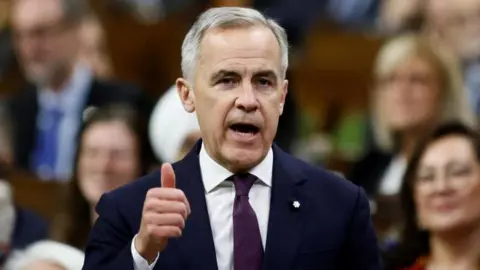Nadine YousifSenior reporter from Canada
 Reuters
ReutersCanada's parliament narrowly approved Prime Minister Mark Carney's first federal budget, allowing his Liberal minority government to avert a snap election.
The budget plan, which increases Canada's deficit to a projected C$78 billion ($55.3 billion; £42.47 billion), was passed thanks to crucial support from opposition MPs, including Green Party leader Elizabeth May.
Many opposition lawmakers sharply criticized the budget plan, the second largest in history. The plan passed with 170 votes in favor and 168 against.
Carney, a former central bank governor in Canada and Britain, defends the budget as a “generational investment” to help Canada strengthen its economy.
The vote was crucial for Carney's Liberal government, which is currently two seats short of a majority.
This meant that if all 169 Liberal MPs voted in favor, the budget would need the support of either two Opposition MPs or four Opposition MPs would abstain.
Two NDP MPs abstained, along with House Speaker Francis Scarpaleggia, who votes in the event of a tie. Conservative MPs Shannon Stubbs and Matt Genero, who announced their resignations earlier this month, also abstained.
The support of Green Party leader Elizabeth May also proved decisive. May told reporters she voted yes based on commitments Carney made that he would support Canada's climate goals.
“Without what I heard from the Prime Minister today, I would have voted no,” she said.
The Conservative Party, led by Pierre Poilievre, and the Bloc Québécois nationaliste voted against the budget, accusing Carney's government of failing to address budget affordability issues.
Poilievre called the budget a “credit card budget,” arguing that it does little to address the cost of living crisis.
“Because of the prime minister's costly deficits, our future depends on a national credit card,” Poilievre told the House of Commons on Monday before the vote.
Liberal MP Nathaniel Erskine-Smith, who supported the budget, expressed his own concerns, saying that while the plan offered much-needed investment, it failed to address Canada's housing crisis and stalled progress on climate change.
 Getty Images
Getty ImagesThe budget proposes C$140 billion in new spending over the next five years “to improve Canada's productivity, competitiveness and resilience.”
It includes money to upgrade ports and other trade infrastructure with the goal of doubling Canadian exports to markets outside the U.S. over the next decade.
Additionally, the plan includes direct support for businesses affected by U.S. tariffs on Canadian goods, with the Carney government predicting these initiatives will attract C$1 trillion in private sector investment over the next five years.
To balance the budget plan, Carney proposed cutting the federal workforce by 10% in the coming years, a move that drew sharp criticism from public sector employees who warned that cutting the federal workforce would slow down the government.
The budget was first proposed in early November and has already gone through two votes.
The debate surrounding it was partially overshadowed by the partisan drama between Carney's Liberals and the Conservative opposition, which lost a caucus member to the Liberals shortly after the budget plan was proposed.
Nova Scotia's Chris d'Entremont said he defected because of what he believed was Conservative leader Pierre Poilevre's “negative” political style. He added the Liberal budget “meets the priorities” of his constituents.
Another Conservative MP, Matt Genereux of Alberta, resigned from parliament later that week, saying he did so to spend more time with his family.
The departure raised questions about Poilievre's leadership. He told reporters on Wednesday that he plans to remain leader.
“My plan is to continue to lead and be the only leader who fights for an affordable Canada where our people who work hard can afford a house and food,” Poilievre said.









